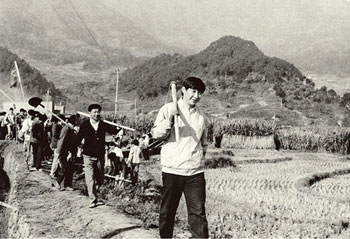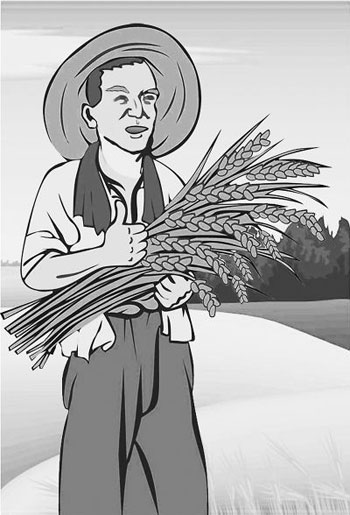CCTV, a vegetable farmer in Zengcheng, has been exposed as a poison to kill pests.
CCTV exposed that vegetables in Guangzhou Zengcheng were sprayed with highly toxic pesticides.

Vegetables in Zengcheng, Guangzhou are sprayed with highly toxic pesticides (video screenshot)
At present, China has gradually become the largest vegetable producer and consumer in the world. In 2013, the sown area of vegetables in China reached about 200 million mu. In addition to large-scale vegetable bases, there are more than 50 million small loose vegetable farmers engaged in commercial vegetable production all over the country, of which vegetable farmers with a production scale of less than 5 mu account for about 98%. So, what about the food safety of these retail vegetable farmers growing vegetables?
During the investigation in Zengcheng and other places in Guangzhou, the reporter found that vegetable farmers prepare pesticides and give medicine to vegetables, and many of them are highly toxic pesticides! I feel terrible when I think about it.
Retail vegetable farmers rely on their own operation to apply fertilizer and medicine.
Zengcheng District, located in the outer suburbs of Guangzhou, is one of the important vegetable producing areas in South China. Through a visit, the reporter found that there are mainly two modes of local vegetable cultivation: one is a large vegetable base, where the administration and fertilization of vegetables is all corporate management; the other is retail planting mainly of individual vegetable farmers, which are scattered in a number of townships in Zengcheng district, and these retail vegetable farmers all operate by themselves in administering medicine and fertilizing vegetables.
In the retail vegetable growing area of Baijiang Village, Shitan Town, the reporter met a vegetable farmer who was administering medicine to his vegetables and witnessed the whole process of preparing pesticides. I saw him pour several pesticides into plastic buckets and mix them. When one of the bottles of pesticides was opened, the reporter smelled a pungent smell. The word "chlorpyrifos" is printed on the packaging of this bottle of pesticide.
To protect the harvest pesticide toxicity, regardless of whether it is high or low.
Chlorpyrifos is a moderately toxic insecticide. As the results of pesticide residue verification tests show that there is still a risk of excessive pesticide residues even if chlorpyrifos is used in accordance with the prescribed methods and doses, in 2013, the Ministry of Agriculture issued notice No. 2032, which decided to cancel the registration of chlorpyrifos on vegetables with effect from 31 December 2014. Article 36 of the regulations on the Administration of pesticides stipulates that no unit or individual may produce, operate or use pesticides that are explicitly prohibited by the state or whose registration is cancelled.
However, the chlorpyrifos pesticide, which has been deregistered on vegetables, is often used repeatedly by some retail farmers, and almost all the used pesticide packages are thrown away by vegetable farmers.
Subsequently, the reporter investigated the whole retail vegetable growing area nearby and found more abandoned pesticide packages, many of which were printed with the words "carbofuran" or "carbofuran" or "methamidophos". These are highly toxic pesticides. As early as 2002, the Ministry of Agriculture issued notice No. 199, which clearly stipulated that they should not be used on vegetables.
Some vegetable farmers say frankly that the main way to grow vegetables in the open air is to rely on heaven for food. Due to objective reasons such as local climate and soil, they have to fight diseases and insect pests almost every day, so no matter whether pesticides are low-toxic or high-toxic, they have no choice in order to eradicate diseases and insect pests and ensure harvest.
It is common to use highly toxic pesticides in blind areas.
From June to October this year, the reporter also conducted many investigations on vegetable cultivation in Shandong, Henan, Hebei, and other places, and found that all kinds of used pesticide packaging can be seen everywhere in the vegetable growing areas of some retail vegetable farmers in these areas. many of them are moderately toxic pesticides restricted by the state and banned highly toxic pesticides. There is a common phenomenon in these areas, some local regulators mainly focus on some large vegetable planting bases, while some retail vegetable growing areas have almost become regulatory blind areas.
The agricultural product market only sees the toll collector but does not see the agricultural residue tester.
Such vegetables grown by retail investors are generally sold through local agricultural markets. China's Agricultural products quality and Safety Law clearly stipulates that agricultural products wholesale markets should set up or entrust agricultural products quality and safety testing institutions to conduct spot checks on the quality and safety of agricultural products sold on the market. If it is found that it does not meet the quality and safety standards of agricultural products, the seller shall be required to stop the sale immediately and report to the competent department.
However, the reporter witnessed the whole process of vegetable trading at the Seven Star Agricultural products Market in Conghua District of Guangzhou City from more than two o'clock in the morning to more than five o'clock in the morning. It was found that except for two staff members who were busy collecting market management fees from vegetable farmers and vendors, they did not see any inspectors conducting spot checks on pesticide residues in vegetables sold. A security guard in the market told reporters that they seldom conduct spot checks here.
After dawn, when the reporter came to the agricultural product quality and safety testing room specially set up by the market management office, he found that the room was empty, not only some testing reagents had not yet been used, but also no vegetable samples and related test data were seen.
Inspection institutions for quality and safety of agricultural products exist in name only.
The person in charge of this market finally admitted that the daily trading volume of vegetables in their market is as high as tens of thousands of kilograms, and that many of these vegetables have not been sampled for pesticide residues during the sales process of entering and leaving the market. The phenomenon of non-existence of safety inspection institutions is not alone in some agricultural markets that distribute vegetables in Guangdong, Shandong, Hebei and other places. "only the above is strict, so just check it out casually at the bottom." Some marketing staff said so.
Of course, it is the work of the relevant departments to strengthen the monitoring and testing of large-scale bases, but "small and scattered" is an unavoidable reality of vegetable production in our country. "with the most stringent standards, the strictest supervision, the harshest punishment, and the most serious accountability, we should speed up the establishment of a scientific and sound food and drug safety management system, and adhere to equal emphasis on production and management. strictly control every line of defense from farmland to dinner table, from laboratory to hospital." This is not only the requirement of the party and government, but also the expectation of consumers.
Related
- A course of planting techniques and methods on how to grow carrots
- How to plant the latest tulips?
- Is it better to pick tea in the morning or in the afternoon? When is the best time for tea to be picked? what is the third or fifth tea?
- Launch Yuanxiao Happy combination Haocha + Tea Yuan healthy Taste
- Penghu Tourism "Fireworks 20 Parade with You"
- 2022 West Lake Happiness holds "Digital Revitalization Voucher" and draws iphone13 and laptop.
- Banqiao Fuzhou social houses are designed to change start-up combined with police elimination to create a safe and livable environment
- The convenient measure of "mechanical weeding" in Xinbei has been abused and the Agriculture Bureau has imposed heavy penalties on the illegal land consolidation.
- Changgeng University Joins Hands with Four Memory Factories to Rescue Memory Talent Shortage
- The list of Taiwan's top 100 MVP managers is listed by the Director-General of the Farmers' Association of Sanxia District.



